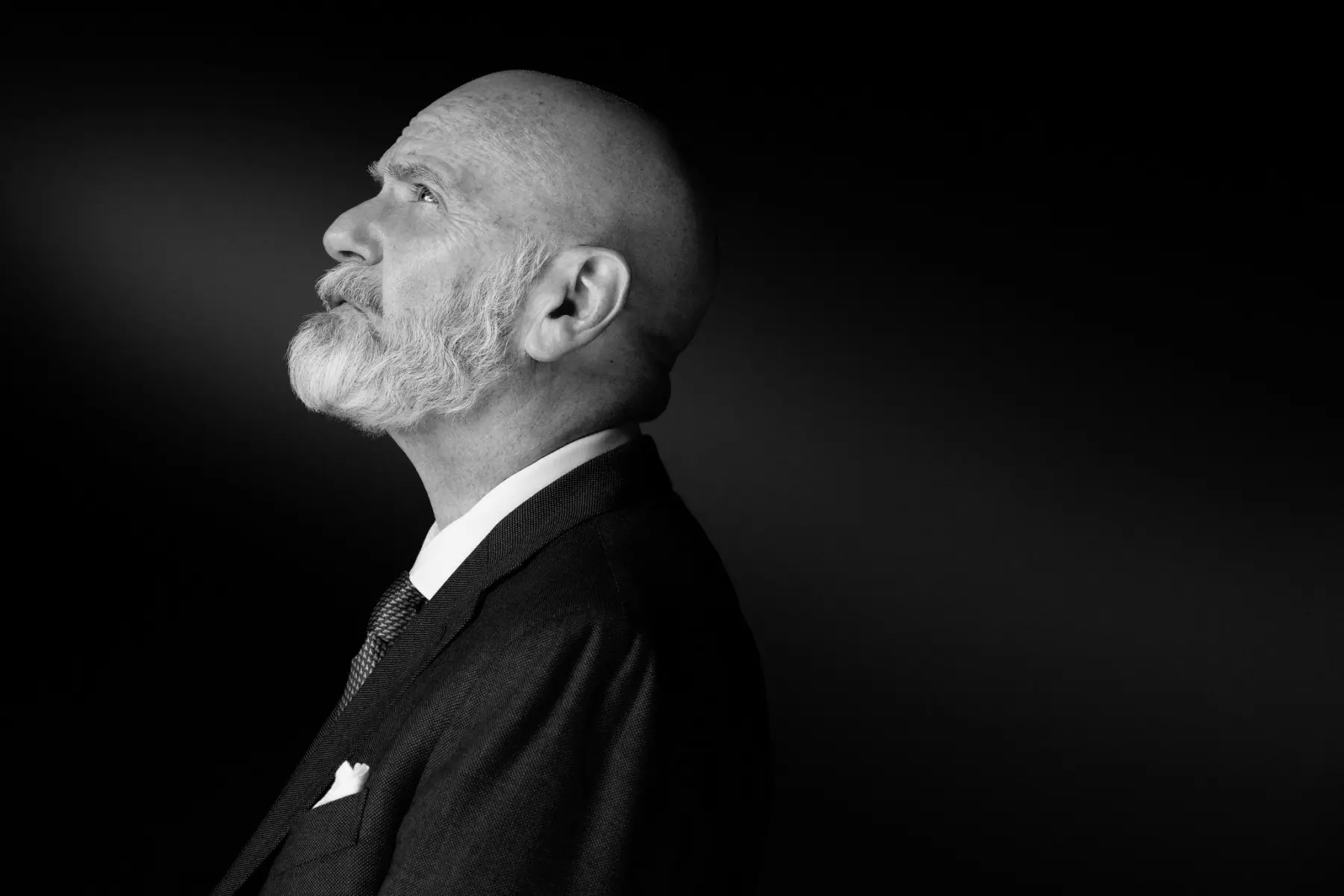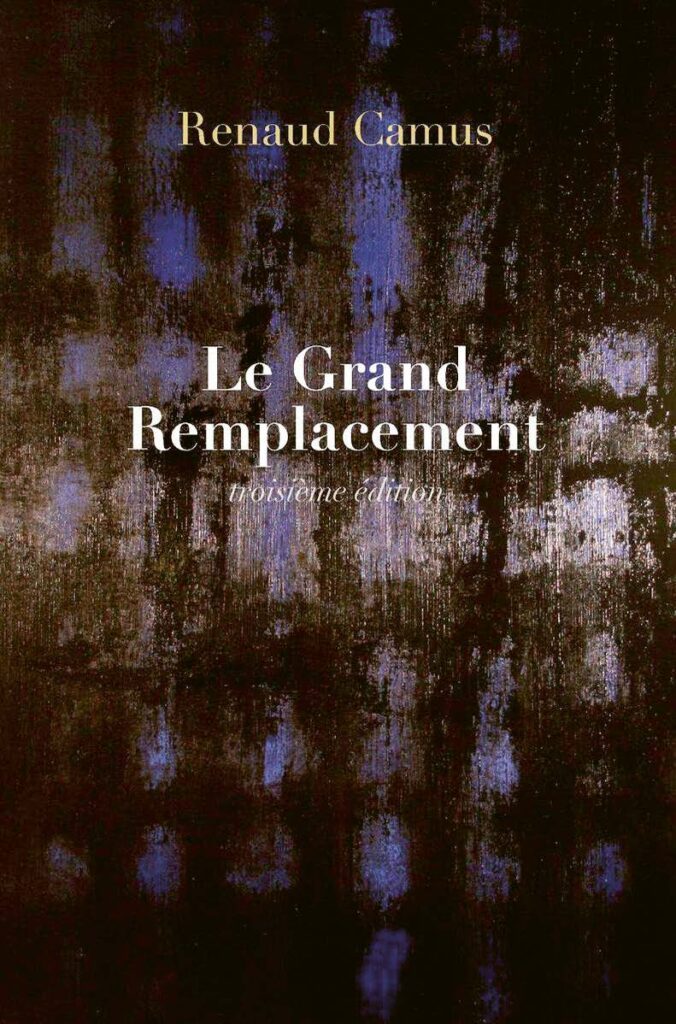
Renaud Camus is perhaps the most controversial living French writer. To read most media coverage about this gay socialist is to be told that he is a ‘far-right’ racist. This is because Camus is the progenitor of “Le Grand Remplacement,” the claim that the native populations of Western nations are being replaced. Rather than using labels or relying on hearsay, we believe it is better to present Camus’ influential ideas in his own words. In the following conversation, Camus explains that Le Grand Remplacement is not a conspiracy theory or racist narrative but a feature of post-modernity.
EDITORS’ NOTE: On November 18, 2024, Camus posted on X:
An English translation of my 2011 book The Great Replacement was to be published this week by Amazon, who now refuses to print and diffuse it. That book is absolutely not what mainstream media and propagandists pretend it is. Contrary to legends profusely widespread by hardcore immigrationists, Wikipedia eminently included, it is in no way a conspiracy theory, it is utterly devoid of the slightest antisemitism and it is absolutely not an incitement to violence. It is a very serious political essay on mass migration, which, in the views of more and more experts, has be proven right over and over, unfortunately, by facts and by numbers. It is an essential element of any debate on immigration, multiculturalism and the exchangeability of human beings.

That the Great Replacement is not a far-right conspiracy is the least one can say. Each of these terms is false. The Great Replacement is not a theory: it is a chrononym, like the Great War or the Great Depression. It is a name for an era on the basis of its most significant phenomenon—in this case, the change of people and of a civilization, or “genocide by substitution,” as the black poet and long-serving communist mayor of Fort-de-France, Aimé Césaire, called it.
In my book of the same name, Le Grand Remplacement, the idea of a conspiracy never arises. That would be a totally ridiculous way of describing the enormity of the industrial, financial, cybernetic, and even metaphysical mechanisms that have led to this disaster, which has at its core replaceable man, interchangeable at will. Since the Great Replacement is not a theory but a fact, it cannot be a conspiracy theory or a theory of the far Right.
That said, I do indeed have a theory about the causes of this phenomenon: global Davocratic replacism. This is a theory of the growing managerial administration of the human community by banks, hedge funds, pension funds, Big Tech, the Davos elites, cybernetics, etc. I have presented this theory in various books, with Le Grand Remplacement being merely the most factual of them. The other books include Du sens, De l’innocence, Le Petit Remplacement, La Dépossession, and La Destruction des Européens d’Europe.
However colossal it may be, the Great Replacement is only a small part of what I call global replacism, an interpretive framework of the world born of the observation that replacement—that is, the action of replacing—is the principal activity of modern and contemporary societies. Global replacism is a totalitarian and holistic ideology that, in my view, clearly originated in the English-speaking world and in the United States in particular. It drew its inspiration from both the First and Second Industrial Revolutions. Frederic Winslow Taylor is its ‘god’—or, if you prefer, its Karl Marx. Taylor is to replacism what Marx is to Marxism: “In the past, the man has been first; in the future, the system must be first.” Henry Ford was its prophet.
The adjectives ‘slandered’ and ‘misrepresented’ are nice understatements. I have almost never been read—at least not by those who attack me—and I have been dragged through the mud, defamed, ‘wokipediafied,’ blamed for all the sins of the world, dropped by all my publishers, refused appearances everywhere in the media, summoned before all the courts, heavily fined, and even sentenced to prison (a sentence subsequently suspended). The reason for this could not be simpler: since the Great Replacement is the most important—and also the most obvious—phenomenon of contemporary Western societies by far, it is precisely one that under no circumstances must be named. Those who venture to do so must be silenced by any means necessary.
One of the main reasons for this partial failure, in my view, is that these supposedly ‘democratic’ elections were an absolute farce. In the mainstream media, democratic parity was more or less respected, albeit reluctantly, with parties each day allotted 15 minutes at the time of the official news. But the rest of the time, the fix was in: nearly every broadcast was devoted to smearing Marine Le Pen’s party, which was implicitly likened to Nazism or the First Collaboration: that of the Vichy years. The National Rally couldn’t even object, for to do so would be to acknowledge that it indeed felt targeted by such talk (and thus, in some sense, deserved it). The manipulation of minds—already well advanced by the educational system, the university system, and the entertainment and stupefaction industries—did not for a single moment let up. Under such conditions, who could possibly take the results seriously?
They are not traitors; they are in perfect conformity with what I call “the Genocidal Bloc”: that is, the unshakeable alliance of right-wing interests and left-wing ideals, of globalized Davocratic hyper-capitalism and antiracist egalitarianism, both of which desire a deracinated, denationalized, declassified, deculturated, de-historicized humanity, dispossessed of everything that might hamper general interchangeability. Both favor what was brilliantly anticipated and described by Zygmunt Bauman: the liquefaction of the species, which is a necessary condition of its total interchangeability (and a prelude to its liquidation—but that’s me talking). Everything that might prevent this is successively eliminated: first it was distinct peoples, now it is the sexes. Undifferentiated Human Matter (UHM) must be perfectly fluid.
Oh, he came in handy, at least for men like me: he was the absolutely ideal—one might even say paradigmatic—representative of Davocratic global replacism. He is its purest product—nearly a caricature—and he long demonstrated its omnipotence. Macron is the perfect illustration of what could be called direct Davocracy.
The Machine—what Heidegger called the Machination or the “enframing,” which refers more to a way of thinking, a logic, to pure industrial and financial mechanisms—presently considers itself strong enough to dispense with all intermediate structures and directly take in hand the affairs of nations. Macron destroyed the great traditional political parties by taking away their financing, their territorial collectivities, regions, departments, and town councils—and now he seems to be in the process of destroying the regime itself, even though it is one of the sturdiest France has known in a long time.
If someone were to ask me to describe in one word what I mean by Davocracy, I might respond: Macron.
I fear that she is being honest and that this is indeed what she believes. Her declaration is truly the worst that can be said of the Republic and its values. And it is, indeed, true that the so-called values of the Republic have, for 30 or 40 years, invariably supplied the road map—the rules and regulations—for genocide by the Great Replacement.
That said, it would no doubt be wrong to especially blame the French Republic. Without looking farther afield, neighboring monarchies such as Belgium and Great Britain have been the scenes of an even more drastic change of people than France. It is not the Republic that is bringing about the destruction of the Europeans of Europe and their genocide by the Great Replacement. It is a consequence of egalitarian antisexist antiracism in the service of Davocratic global replacism and the Machination—of the
machine-becoming of the human race, of the (consumer) product-becoming of all individuals.
The Great Replacement has three protagonists: the replacists, the replacers, and the replacees. Naturally, the replacists are the allies of the replacers, who provide the base of their political power and constitute their pampered clients. The more replacers there are—and there are more every day—the greater the success of the replacists. But being the closest, they are also the most exposed, and they will thus be the first to be devoured.
Increasingly, the replacers already judge that they can do without the replacists—a bit like how the Davocracy increasingly believes that it can do without the political class. Though each believes itself to be using the other to achieve its goals, these two totalitarian rivals—global replacism and Islam—are heading towards an inevitable confrontation.
The idea is not so absurd since it has succeeded wonderfully. It falls under what I have called “Hitler’s Second Career.” This refers to his inverted career, with the Führer appearing on air, in the media, around the clock. The recent election campaign in France provides a striking example of this. It is true that this tactic is fundamentally absurd, but it is very effective—all the more so since what the mainstream media calls the ‘far Right’ covers nearly 40% of the political spectrum, and thus starts slightly to the right of the center. The far Left, in contrast, hardly occupies 1% of the same spectrum: the extreme extremity of its left extremity.
There is obviously nothing extreme about anti-replacism—that is, the refusal to regard man as a replaceable and interchangeable consumer product, the resistance to invasion, the rejection of colonization. Our role models are those who have stood for the right of self-determination of peoples in the 19th century—in Greece, Bulgaria, Hungary, Bohemia, Italy, Ireland, etc.; those who resisted Nazism (which, after all, invented the Great Replacement—Umvolkung—for the lands it briefly conquered in the East); anti-Soviet dissidents; and, of course, the exponents of anti-colonialism.
Europeans must not forget that, in Europe, it is they who are the indigenous population, and that the colonists are all the peoples who have been imposed upon them against their will by Davocratic global replacism.
If I did not include Michel Houellebecq alongside my two ‘prophets’ it is because he does not belong to the same generation. His is nearly the same as mine: our books are contemporaneous. I was even writing before him. That said, I’ve always thought and have always said that, with very rare exceptions, there is more truth about our situation and about our future to be found in the least of his books than in all of sociology. This is the dazzling revenge of literature against the so-called ‘human sciences.’
If Houellebecq’s warnings have had no more effect than mine—even though he has a thousand times more readers—or those of Raspail and Powell, it is for the reasons I presented above: the industries of man want undifferentiated human matter—and anything that opposes them is smothered, defamed, crushed, reduced to silence and social death.
Unfortunately, up till now, these have not been especially solid alliances, nor perhaps even especially real. Yet over the course of history, they are the ones that have always presented themselves when the most important things were at stake: the very survival of nations and civilizations. Although they hated one another, Athens and Sparta were allied at the time of the Persian wars; in London, Jews allied with the antisemitic patriots of Action Française around General de Gaulle; and, for a time, Hindus even allied with Muslims in favor of the independence of India.
Since I am—or at least desire to be—in-nocent, non-nocent, non-harmful, non-violent, Gandhi is naturally one of my masters, to say nothing of General de Gaulle or Leonidas at Thermopylae (though I certainly do not have the latter’s courage).
Despair.
This essay appears in the Fall/Autumn 2024 issue of The European Conservative, Number 32:44-47. An abridged version of this interview was previously published by us on August 16, 2024.
